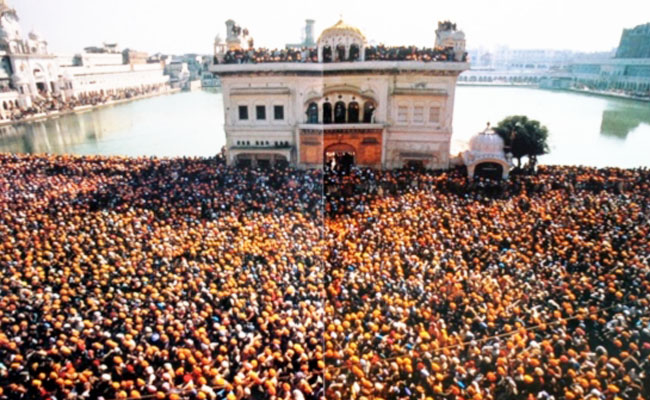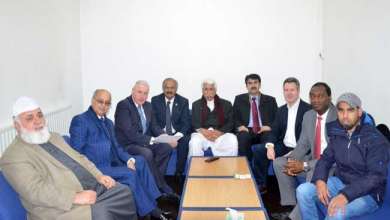It is time Global policy makers endorsed The Sikh Nation’s lawful struggle for Self-Determination

London: The unprecedented flurry of diplomatic and legal developments relating to India’s transnational terrorism over recent days has rightly led to international focus on why Sikhs across the world are being targeted for murder. A raft of Indian diplomats has been ignominiously expelled from Canada after being cited as ‘persons of interest’ in ongoing criminal investigations into the assassination of a Sikh leader in Canada last year. Separately, the FBI have charged an Indian intelligence agent with the attempted murder of another Sikh leader in the USA.
Intelligence gathered by the ‘Five Eyes’ and others clearly shows those crimes were committed pursuant to a policy being pursued at the highest levels of the Indian government. The inescapable conclusion is that Indian PM Modi is the real ‘person of interest’, even though his henchmen are the ones being locked up or featuring on ‘wanted’ lists. Meanwhile, Indian spokesmen, of course, simply deny everything.
Western governments are bewildered by the arrogance and audacity of a ‘friendly’ power which has brazenly trampled all over their sovereign rights by killing or attempting to their citizens on their own soil, simply because the victims have exercised their rights to free speech and democratic political activism. That activism is aimed at ultimately securing the peaceable exercise of the Sikh nation’s right of self-determination under international law in its Punjab homeland, by means of a democratic referendum. That referendum has received overwhelming support in the Sikh diaspora but has been criminalised under draconian anti-terror laws in India.
There will no doubt be some kind of damage limitation exercise to mend diplomatic fences, as the usual economic and geo-political pressures resurface. Criminal convictions (the evidence is too incontrovertible to avoid those) of low-level operatives will also be brushed under the carpet as India will try – however absurdly – to blame ‘rogue elements’ within its intelligence and security agencies. None of that will remotely fool the world, which has for many years now seen the Indian state become a serial violator of human rights, as well as intolerant to any form of dissent, wherever or however lawfully expressed.
The Sikhs have been subjected to forty years of systematic killings, torture and arbitrary imprisonment in India. The oppression has crossed all red lines as far as the Sikhs are concerned; their national gatherings have therefore, since 1986, freely resolved to secure sovereign independence; that lawful and legitimate struggle continues today, despite the unrelenting state terrorism used to crush it. In a matter of days Sikhs across the world will mark the 40th anniversary of the mass killings of Sikhs in India in November 1984, which saw an estimated 20,000 butchered in just three days – many of them burnt alive by state sponsored mobs in front of security forces. The genocide was directed by a political class that has never been held to account by a compliant judiciary. In that sense, the recent killings are not new.
However, now that India’s repression of the Sikhs is being discussed at the highest level across the world, it is time the underlying cause of the conflict is also addressed. That would represent the only meaningful response to the Indian state’s criminality, and it will help facilitate enduring conflict resolution in Punjab. There will be huge humanitarian, economic and geo-political dividends to be had in doing so; they will far outweigh the crumbs that Modi is offering foreign suitors whilst he simultaneously treats their sovereignty with disdain.
Put simply, that approach means endorsement of the Sikh nation’s right to self-determination, which India not only refuses to even acknowledge but has unlawfully and brutally suppressed. In July this year the Human Rights Committee, which oversees compliance with the 1966 International Covenant on Civil and Political Rights, demanded India stops abuses against the Sikhs and also withdraws its formal ‘reservation’ against the right of self-determination, which is a bedrock of international law (enshrined in Article 1 of the ICCPR). That unlawful ‘reservation’, which has also been formally condemned by several states such as France, Germany and the Netherlands, together with the terrible violence used to ‘enforce’ it, has defined the Indo-Sikh conflict – and it must end.
Sikhs can – and will – one day restore control over their own destiny and deliver peace and prosperity in their Punjab homeland, in the form of an independent sovereign Khalistan. Sikh statecraft, based on an uncompromisingly egalitarian worldview, demands justice and equality for all citizens of whatever faith, as was experienced during the Sikh kingdom before annexation by the British. Khalistan will also be a force for good in an increasingly dangerous world, acting both as an important buffer state between three hostile nuclear powers and as an upholder of civilised values and international law.
This is the moment that global policy makers should realise the immense benefits of a new decolonisation of Indian-controlled Punjab and, at the same time, give a befitting response to the treacherous and lawless ‘person of interest’ in New Delhi.





